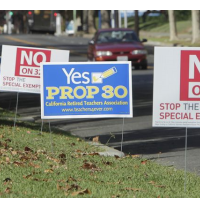Citizen-Initiated Ballot Measures are being Taken Over by Big Business
 (photo: Rich Pedroncelli, AP)
(photo: Rich Pedroncelli, AP)
Ordinary American citizens, often feeling their individual power has been usurped by big corporations, the wealthy, and a government beholden to powerful lobbying interests, are now seeing another of their links to democracy slip out of their grasp: the ballot initiative.
Introduced in the U.S. in 1898, the ballot initiative was a response by progressives to the view that state legislatures were in the pocket of powerful corporate interests. It was a way for the average citizen to adopt laws without the participation of lawmakers. But lo and behold, the ballot measure, it would seem, has now been hijacked by big-money interests for the benefit of big business. And when some initiatives do make their way onto the ballot, powerful corporate interests are often quick to unleash a torrent of cash to beat back the measures from winning at the ballot box.
Just over half of all states have citizen-initiated ballot measures, and in those 26 states, a “network of pollsters, direct mail specialists, lawyers, consultants, signature gatherers and voting data whizzes” are spending and making huge sums of money on this part of the political process, Liz Essley Whyte of the Center for Public Integrity reported.
During the 2014 election, these special interests and election professionals were collectively paid at least $400 million for 85 statewide measures. And that’s during an “off year.” When a presidential election year rolls around, the financial take on the part of this massive ballot-initiative machinery can easily reach a billion dollars, the Center found.
In the country’s largest state, California, a serious player must plan to spend at least $25 million to expect to win with a measure, according to political consultant David Townsend. Sometimes the investment is four times that amount.
During the 2014 election, California represented the largest slice ($115 million) of the $400 million spent across 26 states. Oregon was in second place with more than $75 million spent, followed by Colorado at just over $54 million.
Big corporations and wealthy organizations are the quickest to open their pocketbooks to fight initiatives they see as unfriendly to their interests. Last year, the corporate giant Monsanto poured nearly $11 million into an effort to prevent genetically modified food labeling, while Colorado casinos invested more than $36 million to expand racetrack gaming. Also in 2014, Anthem and its allies spent more than $31 million to crush Consumer Watchdog’s underdog ballot measure (with a small $2.6 million war chest) that would have reined in Anthem’s ability to raise its rates. Six years earlier, Native American tribes spent $107 million to win measures expanding their slot machine operations in California.
“The process has been captured by interests,” David McCuan, a Sonoma State University professor and ballot initiative expert, told the Center for Public Integrity. “It’s been professionalized. It’s expensive.”
Added San Francisco State University political professor Joe Tuman: “There’s no question that when business or corporations or entities that are affected by ballot initiatives give to the ballot initiative process, they're not doing so out of altruism. They’re doing so out of rational self-interest.”
-Danny Biederman, Noel Brinkerhoff
To Learn More:
Political Profiteers Push Ohio's Pot Vote (by Liz Essley Whyte, Center for Public Integrity)
Big Business Crushed Ballot Measures in 2014 (by Liz Essley Whyte, Center for Public Integrity)
Eliminating Corporate Power Over Ballot Questions: Background and Resources for Change (Reclaim Democracy)
Citizen Ballot Initiatives no Match for Corporate Counter-Spending (by Steve Straehley, AllGov)
- Top Stories
- Unusual News
- Where is the Money Going?
- Controversies
- U.S. and the World
- Appointments and Resignations
- Latest News
- Musk and Trump Fire Members of Congress
- Trump Calls for Violent Street Demonstrations Against Himself
- Trump Changes Name of Republican Party
- The 2024 Election By the Numbers
- Bashar al-Assad—The Fall of a Rabid AntiSemite






Comments